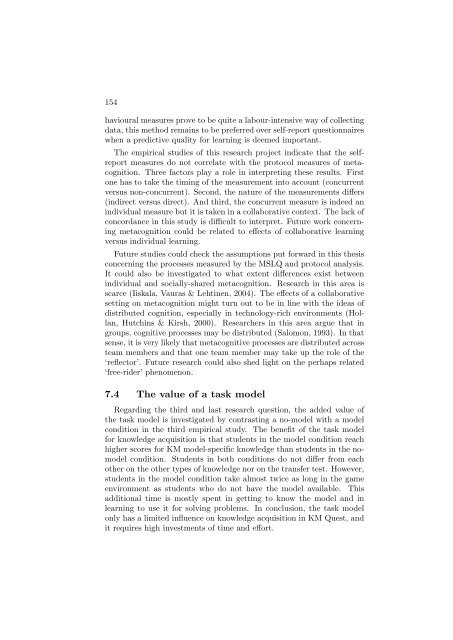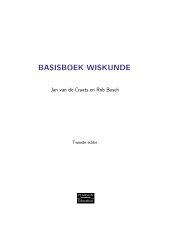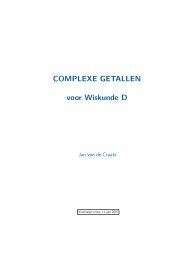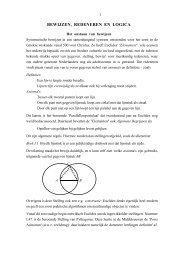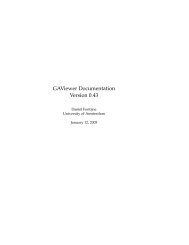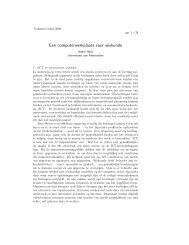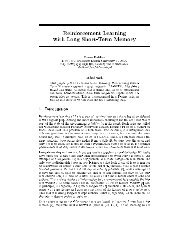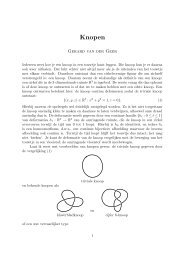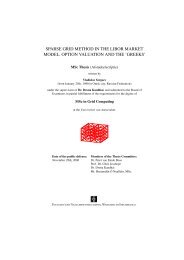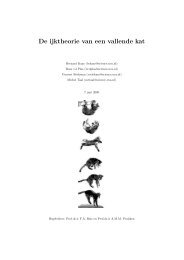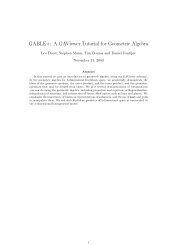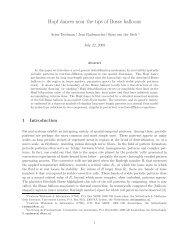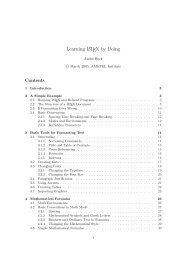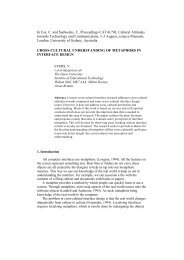The role of metacognitive skills in learning to solve problems
The role of metacognitive skills in learning to solve problems
The role of metacognitive skills in learning to solve problems
Create successful ePaper yourself
Turn your PDF publications into a flip-book with our unique Google optimized e-Paper software.
154<br />
havioural measures prove <strong>to</strong> be quite a labour-<strong>in</strong>tensive way <strong>of</strong> collect<strong>in</strong>g<br />
data, this method rema<strong>in</strong>s <strong>to</strong> be preferred over self-report questionnaires<br />
when a predictive quality for learn<strong>in</strong>g is deemed important.<br />
<strong>The</strong> empirical studies <strong>of</strong> this research project <strong>in</strong>dicate that the selfreport<br />
measures do not correlate with the pro<strong>to</strong>col measures <strong>of</strong> metacognition.<br />
Three fac<strong>to</strong>rs play a <strong>role</strong> <strong>in</strong> <strong>in</strong>terpret<strong>in</strong>g these results. First<br />
one has <strong>to</strong> take the tim<strong>in</strong>g <strong>of</strong> the measurement <strong>in</strong><strong>to</strong> account (concurrent<br />
versus non-concurrent). Second, the nature <strong>of</strong> the measurements differs<br />
(<strong>in</strong>direct versus direct). And third, the concurrent measure is <strong>in</strong>deed an<br />
<strong>in</strong>dividual measure but it is taken <strong>in</strong> a collaborative context. <strong>The</strong> lack <strong>of</strong><br />
concordance <strong>in</strong> this study is difficult <strong>to</strong> <strong>in</strong>terpret. Future work concern<strong>in</strong>g<br />
metacognition could be related <strong>to</strong> effects <strong>of</strong> collaborative learn<strong>in</strong>g<br />
versus <strong>in</strong>dividual learn<strong>in</strong>g.<br />
Future studies could check the assumptions put forward <strong>in</strong> this thesis<br />
concern<strong>in</strong>g the processes measured by the MSLQ and pro<strong>to</strong>col analysis.<br />
It could also be <strong>in</strong>vestigated <strong>to</strong> what extent differences exist between<br />
<strong>in</strong>dividual and socially-shared metacognition. Research <strong>in</strong> this area is<br />
scarce (Iiskala, Vauras & Leht<strong>in</strong>en, 2004). <strong>The</strong> effects <strong>of</strong> a collaborative<br />
sett<strong>in</strong>g on metacognition might turn out <strong>to</strong> be <strong>in</strong> l<strong>in</strong>e with the ideas <strong>of</strong><br />
distributed cognition, especially <strong>in</strong> technology-rich environments (Hollan,<br />
Hutch<strong>in</strong>s & Kirsh, 2000). Researchers <strong>in</strong> this area argue that <strong>in</strong><br />
groups, cognitive processes may be distributed (Salomon, 1993). In that<br />
sense, it is very likely that <strong>metacognitive</strong> processes are distributed across<br />
team members and that one team member may take up the <strong>role</strong> <strong>of</strong> the<br />
‘reflec<strong>to</strong>r’. Future research could also shed light on the perhaps related<br />
‘free-rider’ phenomenon.<br />
7.4 <strong>The</strong> value <strong>of</strong> a task model<br />
Regard<strong>in</strong>g the third and last research question, the added value <strong>of</strong><br />
the task model is <strong>in</strong>vestigated by contrast<strong>in</strong>g a no-model with a model<br />
condition <strong>in</strong> the third empirical study. <strong>The</strong> benefit <strong>of</strong> the task model<br />
for knowledge acquisition is that students <strong>in</strong> the model condition reach<br />
higher scores for KM model-specific knowledge than students <strong>in</strong> the nomodel<br />
condition. Students <strong>in</strong> both conditions do not differ from each<br />
other on the other types <strong>of</strong> knowledge nor on the transfer test. However,<br />
students <strong>in</strong> the model condition take almost twice as long <strong>in</strong> the game<br />
environment as students who do not have the model available. This<br />
additional time is mostly spent <strong>in</strong> gett<strong>in</strong>g <strong>to</strong> know the model and <strong>in</strong><br />
learn<strong>in</strong>g <strong>to</strong> use it for solv<strong>in</strong>g <strong>problems</strong>. In conclusion, the task model<br />
only has a limited <strong>in</strong>fluence on knowledge acquisition <strong>in</strong> KM Quest, and<br />
it requires high <strong>in</strong>vestments <strong>of</strong> time and effort.


